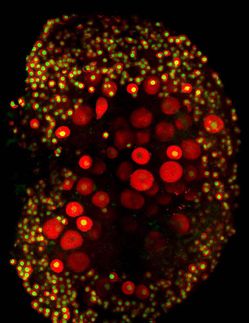NIH renews research program to develop medical countermeasures against radiological, nuclear threats
Advertisement
A major research effort to develop medical products to diagnose, prevent and treat the short- and long-term consequences of radiation exposure after a radiological or nuclear terrorist attack has been renewed by the National Institute of Allergy and infectious diseases (NIAID), part of the National Institutes of Health.
NIAID's Centers for Countermeasures Against Radiation (CMCR) program, first established in 2005, will support research at seven institutions nationwide. NIAID will provide five years of additional funding to the program beginning in fiscal year 2010, for an estimated total of $105 million.
"Medical countermeasures are vital to protecting the public and caring for patients in the event of a deliberate or accidental exposure to radiation," says NIAID Director Anthony S. Fauci, M.D. "Such treatments also might help diminish the organ and tissue damage that occurs after radiation exposure in other settings, such as in cancer therapy."
The CMCR program, part of NIAID's larger medical countermeasures program, supports research in radiation biology as well as projects to develop diagnostic tools to measure radiation exposure and therapeutics to treat the resultant tissue injury. Each center conducts its own research projects and also supports pilot projects proposed by investigators outside the CMCR core program.
In the initial CMCR program, NIAID supported eight centers. Participating investigators developed methods and tools to measure radiation exposure. They also conducted animal model studies to evaluate potential drugs to treat radiation injury to the blood, gastrointestinal tract, lungs, kidneys, skin, and the cardiovascular and central nervous systems.
"The initial program funded 130 pilot studies and attracted a number of new investigators from fields outside radiobiology research," says Narayani Ramakrishnan, Ph.D., who oversees the CMCRs at NIAID. "The CMCRs also developed educational materials in radiation biology for trainees across the United States, including a lecture series, training workshops and virtual classroom."
The next phase of the CMCR program will continue to investigate many of the most promising treatments for radiation injury. A new center at Dartmouth College in Hanover, N.H., will be dedicated to developing techniques and devices that examine the radiation-induced physical and chemical changes in teeth, hair and fingernails. These changes could be used to diagnose radiation injury quickly and non-invasively. The new program also will continue to support pilot studies.
"The original CMCRs formed the cornerstone of NIAID's radiation and nuclear medical countermeasures program and revitalized an area of science that had been dormant for many years," says Daniel Rotrosen, M.D., director of NIAID's Division of Allergy, Immunology and Transplantation. "The accomplishments of the centers are reflected in the large number of articles published, patents filed and non-radiobiology experts who have joined the field. We expect that the next phase will continue building upon these advances."
























































